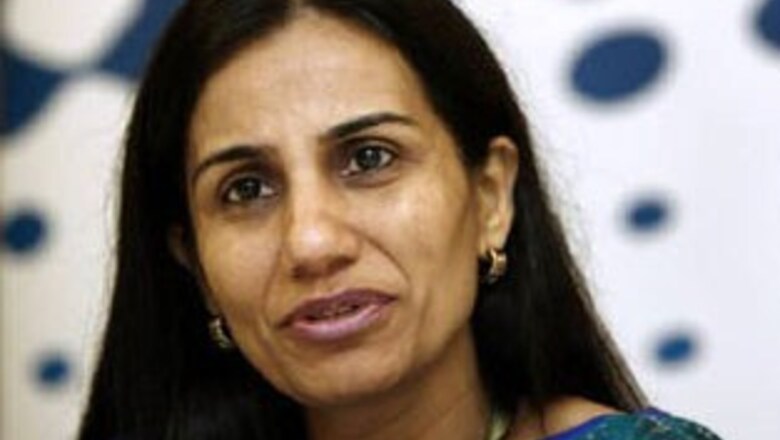
views
KV Kamath will step down as the Managing Director and CEO of ICICI Bank and will hand over the charge to Chanda Kochhar on Monday. Kamath will take over as the Non-Executive Chairman of the board from N Vaghul.
In an interview to CNBC-TV18, MD and CEO, ICICI Bank, Chanda Kochhar, said, “I am confident that along with the great team that I have, we will not just preserve the legacy but we will take the organisation and the group to even greater heights.”
Here is a verbatim transcript of the exclusive interview with Chanda Kochhar on CNBC-TV18.
Q: You are taking over as the Managing Director of the second largest bank. You will be managing the fortune of a Rs 4,00,000 crore book. How does it feel?
A: I feel honoured. I feel it’s a great opportunity and at the same time it’s a great responsibility as well.
PAGE_BREAK
Q: What would you expect your administration or your time to be known for or known as? The last eight years were known as period of growth, expansion, aggression, IT. In a single word if you want to look at the next few years how do you think it will be remembered?
A: Instead of putting a word I would say that this is an organisation that has achieved lots of successes in the past and I am confident that along with the great team that I have we will not just preserve the legacy but we will take the organisation and the group to even greater heights.
Q: A large part of Mr. Kamath’s tenure was known for its expansion, aggression, numbers, and volume, if you have to look from now to the next three years or five years, what do you think would be your watchwords?
A: As an organisation, we believed in growth, innovation, and empowerment. The DNA of the organisation will continue to remain the same but the dimensions of growth and innovation and empowerment have to really be adapted to the current environment. So, I would say growth has many dimensions and its not just a balance sheet growth; you need to look at how you grow the ROE and your low cost deposits from here, you need to look at how you grow your branch network and make it even bigger, so there would be various aspects of growth which are more relevant to the current environment.
PAGE_BREAK
Q: One break from the past has been that you were the head of the retail revolution; I would always refer to Mr Kamath the father of the EMI or the retail revolution, now you are consciously contracting your retail book; how much more do you think it will contract?
A: More than contracting what I would focus on is to say that the products where we are very confident, that the economic environment would contribute to that growth, we would continue to be strong enough for those products, like mortgages, car loans and so on.
On the other hand, products like small ticket personal loans; other unsecured loans are not suited for the current economic environment, so we would not be doing those kinds of products. Whatever number this strategy leads to is what we would se at the end of the year so instead of putting a retail number to our total portfolio, I am putting a strategy to say, these are products that make a lot of sense, we will continue to be aggressive and some we would not do.
Q: Your retail as a percentage of your whole book has come down by a few percentage points, will that happen this year also?
A: You would see investments coming back over a period and you would see greater activity there so the proportions between retail and corporate would adjust further as we go forward.
Q: Another hallmark for the last five-six years has been that you have become an increasingly international bank, would you de-internationalise for some time?
A: I would again say that the growth rates in our international book will now be very different from what we have been in the past. We have been growing at 50-60 per cent in the past and so on but currently if you just see even our Indian corporates, their entire global strategy is much more moderate.
So the growth rates in that book are going to be much more muted than what they have been in the past, but otherwise our focus has been that we look at the Indian corporate and their global requirements and that’s essentially what we are going to keep focusing on.
Q: So the international book maybe bigger than what it is today at the end of a year or two years?
A: At the end of the year it maybe it may just be started compared to what it is just now.
Q: It's important that you raised about Indian corporate going abroad because by one way you funded them was by buying some of their derivative products, would that be something you want to be buying down?
A: I don’t think derivative products really help them expand, I think some of the foreign exchange covers etc what you take, you take keeping in mind your existing liabilities and that’s essentially what even today some of the corporates are continuing to do, if you have existing foreign currency liability, if you don’t have a natural hedge in terms of your exports then you take those products.
Q: You are inheriting a Rs 4,00,000 crore balance sheet. Five years from now – your idea of your first term what do you expect will be the size of your book?
A: When we talk of growth right now rather than putting numbers I would say that growth has many dimensions. We have to grow not just the balance sheet; we have to grow our low cost deposits, we have to grow our sources of recurring fee incomes, we have to grow our ability to cut cost, to manage risk and so on. So there will be lots of dimensions of growth that I would look at and I would set my targets to many of these dimensions and not just balance sheet number that I would give you.
Q: Will not be kind of contradiction and contrary pressures, you want to grow in terms of cost control and yet you want to grow in branches? Will both be possible?
A: That’s the hallmark of the great organisation and a leader; to manage both and the past one year’s experience has shown us that we have started moving on that path. We increased our branches last year and yet we did not grow costs and if we continue to follow that same focus and approach, we will manage these two seemingly contradictory objectives.
Q: You think you will be able to repeat exactly what you did in FY09 in terms of branch expansion and cost control?
A: Yes our intention is to add another 580 branches this year and clearly the focus will still remain controlling costs.




















Comments
0 comment